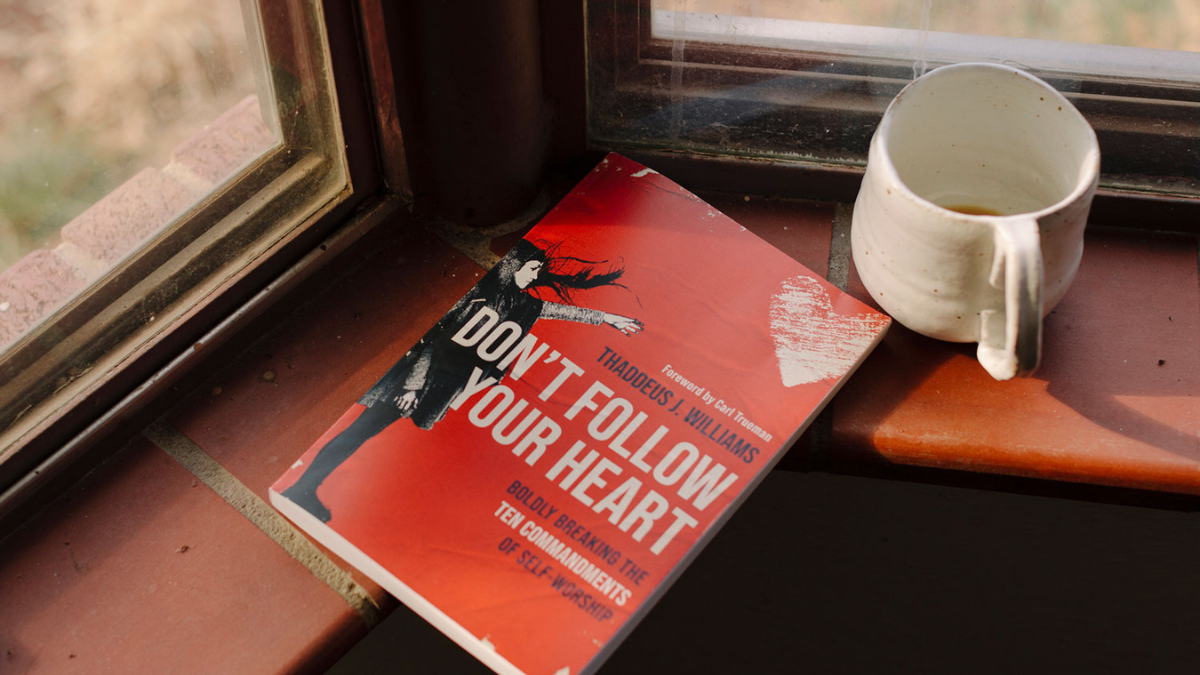

Don’t Follow Your Heart: Commit Cultural Heresy
How to avoid the death spiral of self-worship.
01/31/24
John Stonestreet and Jared Hayden

“Follow your heart” is a slogan popularized by Disney movies, pop psychology, and social media. Ultimately, it is just another version of the oldest lie in the world: That you and I can be our own god.
In his new book Don’t Follow Your Heart: Boldly Breaking the Ten Commandments of Self-Worship, Professor Thaddeus Williams of Biola University has exposed “the cult of self” behind these mantras. The cult of self is, in a sense, the largest religion in the world and promises to elevate adherents to the place and prerogative of God. In the end, however, like all bad ideas about God and self, this lie dehumanizes us, leaving us empty, unsatisfied, and isolated.
Don’t Follow Your Heart is a must-read today, wise in its analysis and practical in its application. Today is the last day to receive a copy as our thank-you for a gift of any amount to the Colson Center this month. Just visit colsoncenter.org/January.
Williams shared more about the “the cult of self” in a recent conversation with Shane Morris on the Colson Center’s Upstream podcast. As he noted, everyone worships something.
For Paul, it’s never a question of the theist versus the atheist. For Paul, everybody worships. Everybody’s a worshipper. Everybody’s on their knees to someone or something, either the Creator or the creation.
The key is right worship. In today’s version of the world’s oldest idolatry, voices across our culture urge us always to put ourselves first, ultimately in the place of God and as the object of our devotion, allegiance, and obedience. At one point, Williams lamented: “Who isn’t telling us to follow our hearts?” This idea, however, has consequences:
Now when you erase the creator-creature distinction, which has happened in the mainstream culture, that attribute of simplicity, or even we might say impassibility, a lot of the divine attributes, sovereignty, we now start attributing to ourselves. And so now if someone denies anything about me, I’m the functional deity in my own universe, I’m the authoritative source and standard of truth.
So, if somebody validates me over here but doesn’t validate this or that way I self-identify, you see how that’s not just two finite creatures agreeing to disagree, and they can go out and hit a round of golf or share a cup of coffee? No, it is heresy. It is blasphemy. It is sacrilege. If you’re denying my self-identity, you have committed the theological equivalent of blasphemy by refusing to acknowledge who I have identified as. So, we need to understand these cultural moments. …
Francis Schaeffer said in the 80s when he wrote Christian Manifesto, on the first page, he says, one of the biggest problems with Christianity in the end of the 20th century is we’ve seen things in bits and pieces instead of as totals. We sort of missed the big picture. So, we think, oh, the problem is over here. It’s pornography. The problem is over here. It’s the gay rights movement. The problem is over here with fill-in-the-blank.
And he says, no, we need to think not in bits and pieces, but in wholes. And part of what I’m up to in the book is to say, we need to see all the political headlines, all the controversial issues of the day, all the flashes in the pan, questions about bathroom access, questions about women’s sports, questions about Israel-Palestinian conflict—underneath all that are worship questions, ultimate questions of meaning. They’re all theological debates at the end of the day.
And if we see that more clearly, we can reach our neighbors more effectively because we can see where they’re actually coming from is the impossible, the burdensome, the soul-crushing perspective that they have to bear the burden of the God-sized task of creating and sustaining their own identity. So, I think that’s the “in” with a generation reared on this stuff, is to sort of ask them like, “How’s that working out for you? … Are you a little bit tired? Are you a little worn out?” Cause man, oh man, from my perspective, I know if I was trying to create and sustain a meaningful identity over time, I would buckle under the weight of anxiety and depression and panic. Wouldn’t it be more freeing to let God do what God does best, be the sovereign meaning-maker, and live an authored life rather than continuing this unsustainable self-authorship?
If the “follow your heart” religion is indeed the dominant religion of our cultural moment, as Williams has argued, Christians, for the love of God and the love of our neighbors, will need to commit cultural heresy. We only find our “true selves” in right relationship with God. Reject the death spiral of self-worship. Embrace the abundant life Christ offers.
Receive a copy of Don’t Follow Your Heart: Boldly Breaking the Ten Commandments of Self-Worship by Thaddeus Williams by making a gift of any amount to the Colson Center by January 31. Just visit colsoncenter.org/January.
This Breakpoint was co-authored by Jared Hayden. For more resources to live like a Christian in this cultural moment, go to breakpoint.org.
Have a Follow-up Question?
Up
Next















